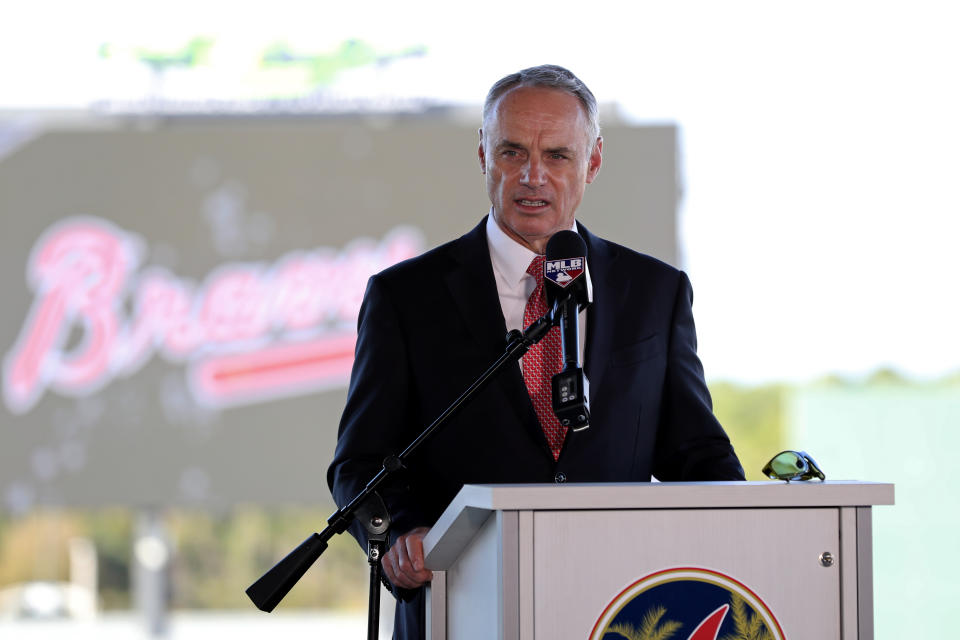As players rage, Rob Manfred says union warded off punishment for Astros

SCOTTSDALE, Ariz. — His world has gone somewhat mad, and some of it is self-inflicted, and every couple days now Rob Manfred gets to stand up in front of everyone and defend his world as being somewhat less mad than it looks.
By Tuesday late afternoon here the commissioner appeared winded. His voice lacked its usual crackle. His tone was muted, starting with an apology for recently calling the Commissioner’s Trophy a “piece of metal,” which he explained as a misguided and regrettable “rhetorical point.” He also revealed his belief, based on player interviews, that the Houston Astros did indeed employ their system of live feeds and trash cans through the 2017 postseason, presumably straight through their World Series championship.
His message remained true. That is, hemmed in by disciplinary immunity Manfred said was insisted upon by the Major League Baseball Players Association, and otherwise unable to gather pertinent facts in regard to the systematic and illegal stealing of signs by the 2017-18 Astros, he chose the course that would provide the most clarity. No players were disciplined or, beyond since-retired player Carlos Beltran, named in his office’s subsequent report.
That Manfred is now under fire from players outside the Astros organization led him Tuesday to reveal the process by which a stalled investigation returned to the union to seek cooperation from accused players. The offer of immunity in exchange for candid information from players outside a core group of Astros hitters, leaving some players vulnerable to discipline, Manfred said, was rejected by the union. The league countered with full immunity for all players, which the union accepted.
In the early conversations regarding player interviews, Manfred said, union officials asked if the league were considering disciplinary measures. He said he responded, “We could not rule that out.”
“The union indicated to us that that would be a problem,” Manfred said. “We went back and suggested to them we would give them an initial list of people — players — that we would grant immunity to, preserving our ability to discipline other players. And the union came back and said that players would cooperate only if there was blanket immunity. Because we were at a bit of a stalemate, we knew we needed player witnesses, we agreed to that immunity agreement.
“Let me be clear — we would not have gotten where we got in terms of understanding the facts, learning the facts, disclosing the facts, if we hadn’t reached that agreement. So, I’m not being critical of anyone. But the fact of the matter is the union wanted an immunity agreement to protect their members. And that’s how we got there.”
The agreement, and the precedent that resulted, would seem to corner the league in future investigations concerning illegal sign stealing. Beyond that, Manfred’s report has been met with complaints from players outside the Astros that the penalties were soft and even non-existent. Rancor, most of it directed toward Astros players and the commissioner, has been heard in every clubhouse.
Justin Turner let the commish have it 😳
(via @NikkiKaySN1)pic.twitter.com/EXmf75ET7g— Yahoo Sports MLB (@MLByahoosports) February 17, 2020
“First, I’ve been around a long time and I’ve never seen the kind of commentary from players about other players, in the entire time I’ve been involved,” Manfred said. “The second reason … one of the principal complaints seems to be that the Houston players were not disciplined. And, you know, that lack-of-discipline immunity was negotiated with the union that represents players.”
He seemed to know this would not end soon, that the madness will resonate, that the battles ahead will be hard, that the sport is on edge. From additional security for whistleblower Mike Fiers on the road and in Oakland, to stricter rules in heavily wired clubhouses, to protecting Astros batters from vigilante justice, to revealing just what it was the Boston Red Sox were guilty of, to the arrival of the next Astros and Red Sox, the game is forever changed. This is what it looks like now. The soundtrack is bitter criticism shouted into live microphones. The beat is anger.
And they haven’t even opened the stadiums yet.
“I think that trust is something that has to be earned,” Manfred said. “Or earned back.”
It’s a long road. They all best catch their breaths.
More from Yahoo Sports:

